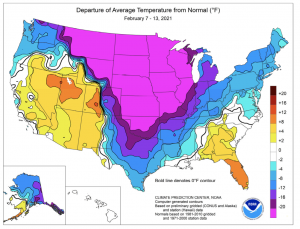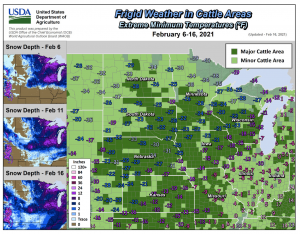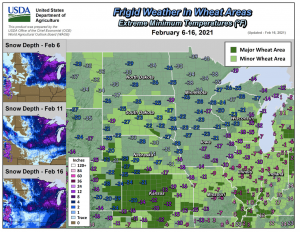A prolonged military conflict in the Middle East could potentially upend key commodity markets due to Iran’s control of the Strait of Hormuz, one of the world’s most important trade…
Winter Storms Take Heavy Toll on Agriculture
Wall Street Journal writer Jacob Bunge reported on Thursday that, “Brutal winter weather continued to batter the U.S. agriculture industry, as companies and farmers contended with snow, ice and cold temperatures that disrupted processing, snarled transport and killed livestock across the Midwest and South.
“Winter storms are sowing challenges from Kansas to Alabama, state and industry officials said. Energy shortages forced meat-processing plants to temporarily close, while ice buildups kept grain barges off rivers and cattle ranchers struggled to save calves born onto frozen ground in the middle of the night.
“The processing and transport disruptions, as well as the loss of animal life, are projected to cost agriculture companies and farmers millions of dollars. Farmers and state agriculture officials said it remained too early to tally all the costs.”

The Journal article explained that, “Clay Burtrum, who raises cattle near Stillwater, Okla., has spent the past few days driving his pastures on the lookout for cows giving birth. On Monday afternoon, he said he grabbed a still-wet newborn calf and set it in the passenger seat of his truck with the heater on high, drying it off before returning it to its mother.
Ranchers on the southern U.S. Plains often don’t build barns, because of their typically milder winters. Mr. Burtrum said some of his neighbors were taking calves into their houses to help them survive the cold, or building makeshift windbreaks from hay bales and trailers.
Mr. Bunge added that, “In Arkansas, Agriculture Secretary Wes Ward said he was monitoring natural gas and power availability to the state’s chicken industry, which he said processes around tens of millions of birds each week. Prolonged disruptions at any point in the heavily interconnected industry, from the hatcheries where chicks are born to the farms where they are fed and the plants that process them, could have impacts on other parts of the chain, he said.”

Also on Thursday, Reuters writer Tom Polansek reported that, “Texas ranchers worked overtime to haul water and hay to cattle to keep them alive during a freak winter storm, but some cows have already succumbed to unusual icy temperatures that also killed chickens, idled meat plants and threatened crops.
“The deaths of baby cows in the top U.S. cattle state and struggles to care for surviving livestock are the latest challenges for ranchers who over the past year have dealt with COVID-19 cutting demand for meat at restaurants and shuttering slaughterhouses.”
Mr. Polansek noted that, “The cold will also kill oats [Kaylin Isbell, a rancher in Florence, Texas] planted for young cattle to graze on, she said. As a result, Isbell said she will need to sell the animals earlier than expected, reducing her profit margins.
“Ranchers nationwide were already facing higher feed costs as corn and soybean prices soared to multi-year highs.”

And earlier this week, Bloomberg writers Michael Hirtzer, Isis Almeida, and Kim Chipman reported that, “In Arkansas, ranchers are fitting pantyhose over the heads of calves in a desperate attempt to keep them warm. In Montana, they’ve been duct-taping calves’ ears to their necks to stop them from falling off. In Oklahoma, newborns arrived onto snow-packed frozen ground and perished while ranchers were reportedly sticking the hardest-hit animals in the front seat of pickup trucks and even inside their homes.
Across the American Plains, South and Southwest, the unprecedented cold of this past week has been brutal on millions of residents. For the flora and fauna — as well as those who make their living cultivating them — it’s been equally disastrous, a Darwinian mix of outlandish and gruesome.
The Bloomberg writers stated that, “Beef packers including Cargill Inc. and Tyson Foods Inc. were forced to shut down meat plants due to energy constraints. Consumers stocking up have also cleared store shelves of food while there are long lines at fuel stations.
“The weather woes, in addition to killing some young animals, will slow the rate of weight gains in cattle as they use energy to stay warm. Lighter animals will mean smaller supplies later this year, a time when consumers already were expected to be paying higher prices for meat due to soaring animal feed prices.”
More specifically on transportation impacts, Thursday’s Grain Transportation Report, from the USDA’s Agricultural Marketing Service, stated that, “Since early February, grain barge movements on parts of the Mississippi River have been delayed and, in some cases, halted because of severe weather. For the week ending on February 13, total downbound grain barge movements were only 679,681 tons—a 14-percent drop from the previous week and 34-percent drop from 2 weeks ago. The decrease occurred despite strong export demand.
It's OFFICIAL!!! There are ice chunks floating down the Mississippi River in Memphis! Very rare to see this far south! Expect an increase in the ice chunks over the coming days! @weatherchannel pic.twitter.com/bie14tTpwJ
— Chris Bruin (@TWCChrisBruin) February 18, 2021
“Since the second week of February, icy water conditions have slowed barge operations on the Illinois River. As of the beginning of this week, in response to forecasts of snow and ice storms, fleet movements have been suspended on the Mississippi River around St. Louis, as well as on the Ohio River, Illinois River, and Lower Mississippi River areas. As a result, barge rates for this week at these locations should be interpreted with caution. The industry expects continuous logistical challenges for the rest of the week.”





